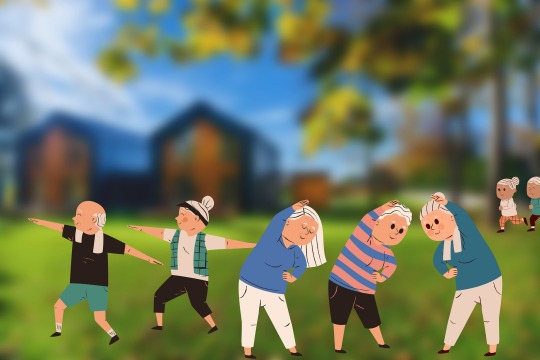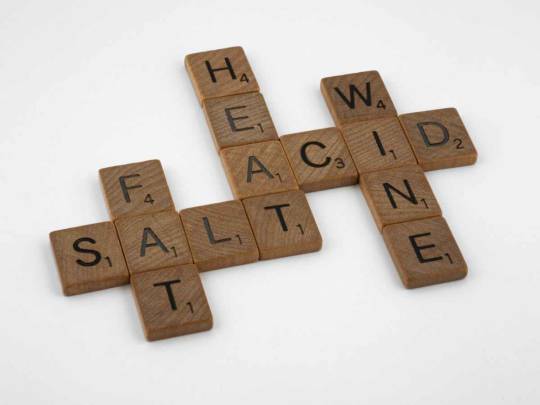#alzheimer’s prevention
Text
A Healthy Lifestyle Might Delay Memory Decline in Older Adults
Feb. 2, 2023 — A new study suggests that following a healthy lifestyle is linked to slower memory decline in older adults, even in people with the apolipoprotein E4 (APOE4) gene, one of the strongest known risk factors for Alzheimer’s disease and related dementias.
A team of investigators in China analyzed 10-year data on over 29,000 older adults with an average age of 72 years. Of these, a fifth…
View On WordPress
#Alzheimer’s about#Alzheimer’s causes#alzheimer’s disease#Alzheimer’s gene#Alzheimer’s prevention#Alzheimer’s research#Alzheimer’s study#dementia#dementia vs Alzheimer’s#how to prevent Alzheimer’s#memory decline#memory decline older adults
0 notes
Text
youtube
#medical medium brain saver: answers to brain inflammation#brain health#medical medium#mental health#healthy aging#health#brain fog#brain food#brain diet#brain foods#staying healthy#food for brain#uc davis health#malaria life cycle animation#autoimmune & eating disorders#alzheimer’s prevention#presentation#fever#expanding human potential#at universal studios hollywood#iowa state university#education#mediterranean diet#infectious diseases#Youtube
0 notes
Text
If you want to participate in science in a fun and low effort way, have a look at the Neureka app. It was developed by the Global Brain Institute of the Trinity College of Dublin, and combines mobile technology with citizen science to help create a clearer picture of what keeps the brain healthy. You play games and track your mood over time, and the data gathered helps researchers figure out new ways to prevent and combat mental health problems and dementia.
It's a very well developed app, the games are fun little brain teasers, and it doesn't take much time commitment to take part. I'd really appreciate it if people would check it out. I live with a parent with Alzheimer's and have issues with cognition myself, so this project is obviously close to my heart. But mental health problems and cognitive degeneration later in life are issues that could affect anyone, and the numbers of those affected are steadily on the rise. More awareness and research are sorely needed.
You can read more about Neureka on their website, and you can download the app on the app store.
Become a citizen scientist! Signal boost this if you can! The more people participate, the more data we can gather, and the better we can use those insights to help improve lives.
#Neureka#Science#Neuroscience#Signal boost#Mobile app#Citizen science#Dementia#Mental health#alzheimers#cognitive impairment#Prevention#Awareness
46 notes
·
View notes
Photo

Canadian Study, with UC San Diego Support, Provides Seniors with Tools to Fight Dementia
The Alzheimer’s Disease Cooperative Study (ADCS) at UC San Diego School of Medicine has partnered with Canada’s largest dementia research initiative, the Canadian Consortium on Neurodegeneration in Aging (CCNA), to launch an innovative online program that offers older adults the opportunity to increase their knowledge of dementia, improve lifestyle risk factors and engage with researchers.
The program, Brain Health PRO (BHPro), offers interactive digital educational modules to empower older adults to improve their physical and mental health, and modify their risk factors for dementia.
BHPro was created through the Canadian Therapeutic Platform Trial for Multidomain Interventions to Prevent Dementia (CAN-THUMBS UP) program, which is part of the CCNA and involves collaboration with the ADCS. The online program focuses on seven different modifiable dementia risk domains: exercise, nutrition, sleep, psychological and social health, cognitive engagement, heart health, and vision and hearing.
For each, the program includes 10-minute educational videos, as well as interactive activities for users to complete. One of the unique aspects of this program will be some of the information gained through wearable devices in its participants. They will be sent smart devices that will record brain activity during sleep, and track their physical activity. These measures will allow researchers to evaluate the impact of the program on participants’ everyday activities and risk factors for dementia. The study of BHPro will support 350 older adults across Canada who have at least one risk factor for dementia, with the goal of seeing participants’ dementia risk reduced throughout the yearlong study.
ADCS has provided leadership and partnership to this project from its inception. Its unique infrastructure has been fundamental to the successful support and launch of the CAN-THUMBS UP program. Howard Feldman, MD, co-director of the ADCS, serves as a member of the co-principal investigator team of CAN-THUMBS UP, and is joined by several UC San Diego faculty and staff members who serve as part of the CTU Steering Committee and Study Operations Team.
“It’s timely to be working with CCNA on this project,” Feldman said. “BHPro’s innovative approach aligns with our own commitment to dementia education, better understanding of lifestyle factors affecting dementia outcomes, and modification of risk factors through new approaches.”
A complementary ADCS study called HALT-AD is being launched in San Diego at UC San Diego. HALT-AD, a pilot study for the Healthy Actions and Lifestyles to Avoid Dementia or Hispanos y el ALTo a la Demencia, is a bilingual, bicultural co-created program. This program is designed and will be available for adults in the community who wish to join an education program and discussion groups enabling them to learn more about dementia, and practice preventive actions.
In addition to these educational initiatives directed at dementia prevention, the ADCS was the recent recipient of a $50 million gift from the Epstein Family Foundation to UC San Diego to support two programs: one for gene therapy for Alzheimer’s disease and the other, a “powder for pennies” (P4P) program, designed to expedite the testing of existing or repurposed drugs and natural products for its treatment.
To learn more about the Alzheimer’s Disease Cooperative Study and its current clinical trials, visit www.adcs.org.
(BHPro is funded by the Canadian Institutes of Health Research and the ASC, and was created through the Canadian Therapeutic Platform Trial for Multidomain Interventions to Prevent Dementia {CAN-THUMBS UP} program, which is part of the CCNA. To learn more, please visit www.canthumbsup.ca.)
— Daniel Bennett
#science#medicine#alzheimer's disease#neurodegenerative disease#aging#dementia#prevention#lifestyle#cognitive decline#senior health
13 notes
·
View notes
Note
He writes with his right, but he is ambidextrous I read forever ago he was born left handed but his grandmother made him wright with his right..
evidently i have brain damage ljdflsjdfsf
#HOW DID I MIX THAT UP SLDJFLSDF#i need to see a neurologist i think im getting Alzheimers.....#no one should take anything i say seriously ever lsijldj#ask#galaxymagick#also unrelated but this (him wearing his watch and stuff on his right hand) reminds me of my grandpa sijdiflsjf#he does that#when i asked why he said he's trying to break his habits to help prevent dementia *clown emoji**laughing emoji*
4 notes
·
View notes
Text
TURMERIC For Brain Health
Damaging Effects of ExcitotoxicityTurmeric’s Brain-Boosting Compounds
BRAIN AND MOOD DISORDERS
Alzheimer’s DiseaseMultiple sclerosisAnxietyNeuropathic painBipolar disorderNeurosisChronic StressObsessive-compulsive behavior (OCD)Creutzfeldt-Jacob (mad cow) diseaseParkinson’s diseaseDepressionSchizophreniaEncephalomyelitisSpinal injuryEncephalopathy (diabetic and…

View On WordPress
#aging#Alzheimer&039;s Disease
Multiplesclerosis
Anxiety
Neuropathic pain
Bipolar disorder
NeurosisChronic
Stress
Obsessive-compulsive behavior (#anti-aging#cancer#stress#turmeric for brain health#turmeric prevents stroke
6 notes
·
View notes
Text
How to Prevent Alzheimer's with Diet?
Alzheimer's disease affects millions of people worldwide, causing memory loss and difficulty in thinking. While there's no cure, research shows that certain foods and diets can help to prevent and manage it. This blog will explore how what you eat can lower your risk of Alzheimer's and keep your brain healthy.
We'll talk about the importance of psychiatrist in patna that prevent dementia, making personalized diets for Alzheimer's patients, and avoiding foods that make cognitive decline worse. We'll also stress the importance of exercise along with a healthy diet to reduce the risk of Alzheimer's.
And we'll discuss diets for vascular dementia, which is a common type of the disease. By the end, you'll know the important ways to prevent Alzheimer's and the top three foods that slow its progress. Let's see how simple changes in what you eat can protect your brain and prevent Alzheimer's.
Preventing Dementia Through Smart Food Choices
Foods to prevent dementia: To prevent dementia, it's important to eat foods that keep the brain healthy. A diet rich in brain-boosting foods is crucial for slowing the progression of Alzheimer's. Blueberries, with their high antioxidant content, protect the brain from oxidative stress.
Leafy greens such as spinach and kale provide essential vitamins and minerals that support brain function. Fatty fish like salmon is a great source of omega-3 fatty acids, which are crucial for cognitive health. Additionally, it's important to consider a personalized diet for Alzheimer's patients, tailored to their specific needs and preferences.
But there are also dementia foods to avoid to keep the brain healthy. Foods like sugary snacks, white bread, and fried foods can cause inflammation and hurt brain cells, so it's best to eat them in moderation. Too much alcohol can also hurt the brain, making it harder to think clearly.
And foods high in saturated fats, like burgers and cheese, can make it harder to remember things. By eating brain-boosting foods and staying away from ones that can hurt the brain, you can lower your chances of getting dementia and keep your brain healthy.
Additionally, blueberries, with their high antioxidant content, are considered the number one food that fights dementia. They are among the top foods to slow Alzheimer's, protecting the brain from oxidative stress and inflammation.
Now that we've discussed the importance of smart food choices in preventing dementia, let's explore how adopting healthy lifestyle habits can further support brain health and reduce the risk of Alzheimer's disease.
Preventing Alzheimer's Through Healthy Lifestyle Habits
Maintaining a healthy lifestyle is crucial for preventing Alzheimer's disease. A balanced diet and regular exercise, such as Alzheimer Diet and Exercise incorporating walking, swimming, or cycling, are essential for supporting brain health. Aerobic exercises like these can boost blood flow to the brain, reducing the risk of cognitive decline.
Moreover, For those at risk of vascular dementia, it's crucial to adopt a diet that supports heart and brain health. The vascular dementia diet focuses on eating a variety of nutrient-rich foods like fruits, vegetables, whole grains, and lean proteins. These foods are packed with vitamins, minerals, antioxidants, and fiber, which keep the heart strong and ensure good blood flow to the brain.
Eating plenty of fruits and vegetables provides essential nutrients that strengthen blood vessels and improve brain circulation. Whole grains, such as oats, brown rice, and quinoa, give long-lasting energy and support heart function.
Lean proteins like poultry, fish, beans, and legumes provide amino acids needed for cell repair and maintenance, while keeping saturated fats low to prevent artery blockages.
It's also important to limit saturated and trans fats, as well as refined sugars and processed foods, as they can harm heart health and increase the risk of vascular dementia. Instead, opt for healthy fats found in nuts, seeds, avocados, and olive oil, which support heart and brain health.
Following a vascular dementia diet rich in fruits, vegetables, whole grains, and lean proteins while cutting back on unhealthy fats and processed foods can help support the cardiovascular system, improve blood flow, and lower the risk of developing vascular dementia.
Besides making changes to your diet, adding various lifestyle habits to your daily routine can significantly decrease the risk of developing Alzheimer's disease. Staying mentally and socially active is crucial for keeping your brain sharp as you get older. Doing activities like puzzles, reading, or learning new things can help your brain stay healthy.
Having good sleep is also important for your brain. When you sleep, your brain processes memories, gets rid of toxins, and repairs itself. Having a regular sleep schedule and doing relaxing activities before bed can improve the quality of your sleep and help your brain work better.
Managing stress effectively is also essential for reducing the risk of cognitive decline. Stress can harm your brain, so finding ways to relax, like meditation, deep breathing exercises, or doing things you enjoy, can help a lot.
By adding these ways to prevent Alzheimer's into your daily routine, you can take control of your brain health and lower your risk of getting the disease. These changes not only help your brain stay sharp but also improve your overall well-being and quality of life.
Conclusion
In conclusion, Including brain-healthy foods in your daily meals is a proactive way to prevent Alzheimer's disease and keep your brain sharp. Choose foods like fruits, vegetables, whole grains, lean proteins, and healthy fats to give your brain the nutrients it needs. Avoid processed foods, sugary snacks, and fatty foods, as they can harm your brain. Regular exercise and keeping your mind active with puzzles, reading, or learning new things also help keep your brain healthy and lower the risk of dementia.
If you're worried about your memory or have a family history of Alzheimer's disease, talk to healthcare professionals or top psychiatrists in Patna. They can give you personalized advice and help you create a plan to protect your brain. Regular check-ups and tests can also help you keep track of your brain health. Making even small changes in your daily routine can make a big difference in keeping your brain healthy and reducing the risk of Alzheimer's disease.
#foods to prevent dementia#diet for alzheimer's patients#dementia foods to avoid#what is the number one food that fights dementia?#alzheimer diet and exercise#vascular dementia diet#10 ways to prevent alzheimer's#what are 3 foods to slow alzheimer's?
0 notes
Photo

Learn how to safeguard your brain and promote mental health as you age. Explore effective strategies for reducing the risk of Alzheimer's disease.
0 notes
Text
When you call the military suckers and losers, then posts like these are self defence against you 🖕
#alzheimers#find a cure#disease prevention#research#military#armedforces#navy#air force#marines#space force
0 notes
Text
Growth Hormone and Alzheimer's Disease: Navigating the Maze
The relationship between growth hormone and Alzheimer’s disease is intricate and constantly evolving. While some questions spark promising avenues for exploration, others remain shrouded in mystery. This revised response delves deeper, incorporating the latest insights and highlighting key areas where further research is crucial.
Growth Hormone’s Influence on Memory:
The jury is still out on…

View On WordPress
#Aging#alzheimer&039;s disease#brain health#clinical trials#cognition#diet#growth hormone#hormone therapy#lifestyle#memory#MK-677#prevention#research#resources#risk factors#safety#side effects#support#Treatment
0 notes
Text
Growth Hormone and Alzheimer's Disease: Navigating the Maze
The relationship between growth hormone and Alzheimer’s disease is intricate and constantly evolving. While some questions spark promising avenues for exploration, others remain shrouded in mystery. This revised response delves deeper, incorporating the latest insights and highlighting key areas where further research is crucial.
Growth Hormone’s Influence on Memory:
The jury is still out on…

View On WordPress
#Aging#alzheimer&039;s disease#brain health#clinical trials#cognition#diet#growth hormone#hormone therapy#lifestyle#memory#MK-677#prevention#research#resources#risk factors#safety#side effects#support#Treatment
0 notes
Text
Alzheimer disease and how it causes to loose memories and remember slower.
Alzheimer's disease, the most common dementia diagnosis among older adults. It is caused by changes in the brain, including abnormal buildups of proteins known as amyloid plaques and tau tangles. Frontotemporal dementia, a rare form of dementia that tends to occur in people younger than 60.8.
Different types of Dementia.
Various neurodegenerative disorders and factors contribute to the development of dementia through a progressive and irreversible loss of neurons and brain functioning. Currently, there is no cure for any type of dementia.
Lewy body dementia, a form of dementia caused by abnormal deposits of the protein alpha-synuclein, called Lewy bodies.
Vascular dementia, a form of dementia caused by conditions that damage blood vessels in the brain or interrupt the flow of blood and oxygen to the brain.
Mixed dementia, a combination of two or more types of dementia. For example, through autopsy studies involving older adults who had dementia, researchers have identified that many people had a combination of brain changes associated with different forms of dementia.
Scientists are investigating how the underlying disease processes in different forms of dementia start and influence each other. They also continue to explore the variety of disorders and disease processes that contribute to dementia. For example, based on autopsy studies, researchers recently characterized another form of dementia known as LATE. Further knowledge gains in the underlying causes of dementia will help researchers better understand these conditions and develop more personalized prevention, treatment, and care strategies.
How dementia is diagnosed?
To diagnose dementia, doctors first assess whether a person has an underlying, potentially treatable, condition that may relate to cognitive difficulties. A physical exam to measure blood pressure and other vital signs, as well as laboratory tests of blood and other fluids to check levels of various chemicals, hormones.
0 notes
Text
Hack Your Brain: 10 Science-Backed Ways to Boost Memory and Mental Sharpness As You Age
Worried about memory lapses as you age? Discover science-backed techniques to sharpen your mind, from foods that boost brainpower to exercises that build cognitive reserve.
As we get older, it’s normal to experience some decline in memory and cognitive function. But research shows you can take proactive steps to boost brainpower and sharpen your mind as you age.
In this article, we’ll explore 10 evidence-based strategies to help improve memory, concentration, focus, and overall cognitive abilities. From brain-healthy foods to memory exercises, stress reduction to…

View On WordPress
#alzheimers prevention#brain health#brain power#cognition#cognitive function#Healthy Aging#memory#memory loss#mental sharpness
0 notes
Text

Discover The Best Food For Alzheimer’s Disease at Livlong
Explore the perfect guide on foods to avoid during Alzheimer's disease. Get more information about diet for Alzheimer's disease that includes soups, vegetables, fruits and more for faster recovery at Livlong.
#diet for alzheimer's disease#alzheimer's diet cure#food for alzheimer's disease#foods that prevent alzheimer's#food for dementia prevention#alzheimers diet
0 notes
Text
How Diet, Exercise, and Stress Influence Alzheimer's Susceptibility?

Alzheimer's disease worsens over time and can't be reversed. It mainly affects thinking, memory, and everyday tasks.
It's the most common type of dementia, which makes it hard to think and function normally. Alzheimer's gradually makes it harder for people to remember things and do simple tasks.
As it progresses, it interferes with daily life and makes it tough to do even basic activities.
Alzheimer's disease is a common condition that affects many people worldwide. It slowly affects how we think and remember things. As the disease gets worse, it becomes harder to do everyday tasks, which can make life tough.
Understanding where Alzheimer's comes from is really important because it helps us find ways to treat and prevent it. This blog is just the beginning of learning more about Alzheimer's disease.
We'll talk about what causes it, signs to look out for, different ways to neuropsychiatric illness treatment in Patna, and things we can do to lower the chances of getting it. Let's start exploring Alzheimer's together and help improve the lives of those affected by it.
What are causes of Alzheimer's ?
Alzheimer's disease is influenced by a combination of factors like our genes, environment, and lifestyle.
Changes in genes, especially in genes like APOE, can increase the chances of getting Alzheimer's by affecting how our brains handle proteins, which are vital for thinking.
Exposure to things like heavy metals and air pollution can also raise the risk of Alzheimer's by causing issues like inflammation and stress in the brain.
Alzheimer's disease caused by deficiency of certain nutrients, or not getting enough of them, can also contribute to the risk of Alzheimer's disease.
Making unhealthy choices, like not being active and eating lots of processed foods and sugary snacks, are also also considered as risk factors of Alzheimer's disease.
But, doing things like exercising regularly and eating lots of fruits, veggies, whole grains, and healthy fats can help keep our brains healthy and lower the risk of Alzheimer's.
Keeping our brains active with activities like reading and spending time with friends can also help keep our minds sharp and delay problems with thinking.
Resources like a "causes of Alzheimer's disease pdf" can give us more information about how Alzheimer's progresses, which helps us understand the different things that can lead to the disease.
Symptoms and Treatment of Alzheimer's disease
Finding Alzheimer's disease early is very important for starting treatment and making things better. Knowing the signs and symptoms is really helpful.
These can include memory problems, feeling confused, having trouble solving problems, and changes in mood or behaviour, which are symptoms of Alzheimer's disease.
As the disease gets worse, people might also have difficulty speaking, understanding space, and doing everyday tasks.
Even though there's no cure for Alzheimer's yet, there are different ways to help manage the symptoms and improve life quality.
Doctors might give medications to help with memory and thinking problems, which is one treatment of Alzheimer's disease, and therapy can help with changes in behaviour.
Making lifestyle changes, like exercising regularly and eating healthy, can also make a big difference.
Getting help early and finding the right treatment can really help slow down Alzheimer's and make life better for those affected.
Types of Alzheimer's disease
Alzheimer's disease is categorized into various types based on age of onset and underlying causes
Early-Onset Alzheimer's:
Affects people younger than 65.
Often runs in families.
Gets worse quickly with severe symptoms.
Late-Onset Alzheimer's:
More common in people 65 and older.
Affected by lifestyle factors like diet and exercise.
Develops slowly with symptoms getting worse over time.
Sporadic Alzheimer's:
Happens randomly with no clear genetic cause.
Linked to getting older and environmental factors.
Familial Alzheimer's:
Caused by genetic mutations passed down in families.
Affects multiple generations.
Usually starts earlier and progresses faster.
Prevention of Alzheimer's Disease
There are ways to prevent Alzheimer's. Doing exercises for our body and brain, like walking and solving puzzles, keeps our minds sharp and stops them from getting worse.
Eating lots of fruits, veggies, and foods with omega-3 fatty acids, like fish and nuts, helps keep our brains healthy and lowers swelling.
If we have health issues like diabetes or high blood pressure, taking medicine and changing how we live can stop them from hurting our brain and making our thinking worse.
Spending time with friends and doing things that make us think, like reading and learning new stuff, also helps keep our thinking strong and lowers our chances of getting Alzheimer's.
Doing these things helps us take control of our brain health and lowers our risk of Alzheimer's.
Conclusion
In conclusion, Alzheimer's disease is different for everyone. Understanding it well and spotting early signs of memory problems are important for handling it better.
Also, eating healthy and taking care of other health issues can lower the chances of getting Alzheimer's. It's also vital to support research, education, and advocacy to make more people aware and improve how we treat the disease.
By focusing on these things, we can work towards a future where Alzheimer's isn't as big of a problem for people and their families, making life better for those affected.
For expert guidance and treatment options, consider consulting the best psychiatrist in Patna, Bihar, specializing in neuropsychiatric illness treatment in Patna.
#best psychiatrist in Patna#Bihar#neuropsychiatric illness treatment in Patna#what are causes of alzheimer's#causes of alzheimer's disease#alzheimer's disease caused by deficiency of#risk factors of alzheimer's disease#treatment of alzheimer's disease#symptoms of alzheimer's disease#how to prevent alzheimer's disease#types of alzheimer's disease
0 notes